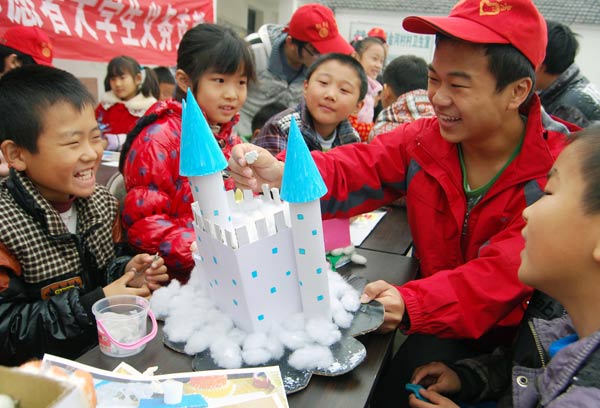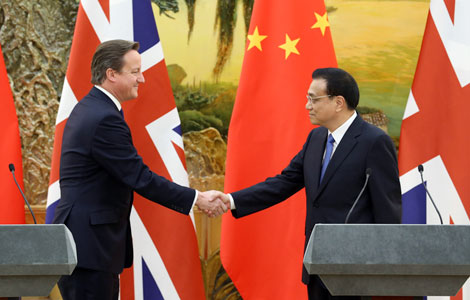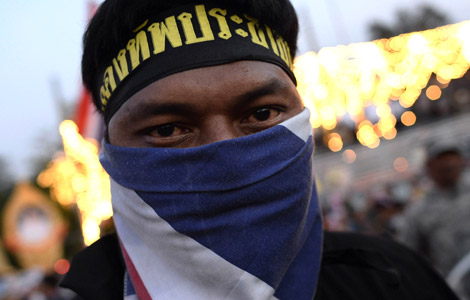Tapping the power of youth volunteers
Updated: 2013-12-03 01:16
By He Dan (China Daily)
|
||||||||
Group unveils plans to improve conditions for unpaid workforce
|
 |
|
Student volunteers from Jiangsu University of Science and Technology play with children in Jinhe, Jiangsu province. The children were left behind by migrant worker parents who have traveled to cities to work. Shi Yucheng / For China Daily |
China's largest youth organization announced plans on Monday to encourage 20 million citizens to become registered volunteers within the next five years.
Currently, there are about 40.4 million registered volunteers and some 130,000 volunteer organizations nationwide, according to the Communist Youth League of China Central Committee.
Wang Hongyan, head of the organization's secretariat, said the league will make online registration easier and set up more interesting projects to boost young people's enthusiasm for volunteer service.
"They vote with their feet. If a program doesn't sound appealing, they will not come," she said at a Beijing news conference at which the youth league's development blueprint was unveiled.
The conference was called by the State Council Information Office.
The list of registered volunteers has seen steady growth in China in recent years, with an annual increase of about 3 million. Volunteers devote at least 10 hours annually to volunteer work, Wang said, but given the huge demand from society, they cannot deliver enough quality services to meet the need.
Deng Guosheng, director of Tsinghua University's NGO Research Center, said that most volunteers on the mainland have three channels through which to serve — youth leagues, grassroots NGOs and community-based volunteer organizations affiliated with civil affairs departments.
"Youth leagues in China boast the largest number of volunteers but most of them are not active," he said, adding that incentives are insufficient to induce volunteers to devote time and energy for "image booster" projects.
Deng said youth leagues should consider shifting their role from voluntary project organizers to service providers for grassroots organizations, helping with fundraising, training and other support.
Cao Ranran, a director of a campus society that organizes Wuhan University students to teach rural students art and sports, said increasing numbers of college students are interested in volunteering in their spare time.
"Funding is our biggest problem," said the 23-year-old. Cao urged youth leagues to provide sustainable funding to his organization so that it can survive and recruit more volunteers.
Wang, with the CYL, said some chapters in East China have started pilot projects to explore cooperation with grassroots organizations. They act as incubators that empower volunteer organizations — even sometimes arranging rent-free workplaces.
Fanny Chan, country director of VSO China, an independent international development organization that offers volunteers a chance to work abroad to fight poverty in developing countries, urged youth leagues to promote legislation to better protect volunteers' rights and prevent them from becoming a kind of "cheap labor".
"It's not difficult for China to boost the number of volunteers, but providing necessary support and protection for them will be a big challenge," she said.
A poll of 278 voluntary organizations in Beijing found that less than 12 percent of them made contracts with their volunteers, while only about half of the organizations purchased safety insurance.
The Beijing Volunteer Association conducted the survey in 2011.
The challenges of protecting volunteers' rights includes a liability exemption for volunteers who make mistakes, and protection for those who have an accident or fall ill during the course of their service, Wang said.
She said the State Council has drafted regulations on volunteering and is soliciting opinions from government departments.
Most Viewed
Editor's Picks

|

|

|

|

|

|
Today's Top News
China shares slide on move to restart IPOs
Economic rebound not likely: group
Cheap luxury, startup required
 Drama Rhinoceros In Love staged in New York
Drama Rhinoceros In Love staged in New York
Washington's panda named Bao Bao
Candid exchange key to Biden's visit
At least 4 dead in NYC commuter train derailment
China's new billionaires may have a lot to learn
US Weekly

|

|













